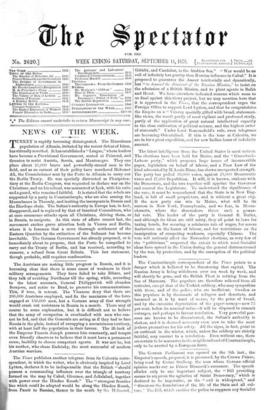The Times publishes another telegram from its Calcutta corre- spondent,
in which the writer, who is obviously inspired by Lord [ Lytton, declares it to be indispensable that the British "should IIpossess a commanding influence over the triangle of territory formed on the map by Cabul, Ghuznee, and Jellalaba.d, together with power over the Hindoo Koosh." The "strongest frontier line which could be adopted would be along the Hindoo Koosh, from Pamir to Bamian, thence to the south by the Helmund, Girishk, and Candahar, to the Arabian Sea." "War would be an evil of infinitely less gravity than Russian influence in Cabul." It is proposed to guarantee the Aineer territorially and dynastically, but " to demand the dismissal of the Russian Mission," to insist on the admission of a British Mission, and to plant agents in Balkh and Herat. We have elsewhere indicated reasons which seem to us final against this viewy project, but we may mention here that it is approved in the Times, that the correspondent urges the Foreign Office to support Lord Lytton, and that he congratulates the Empire on a "Viceroy specially gifted with broad, statesman- like views, the result partly of most vigilant and profound study, partly of the application of great natural intellectual capacity to the close cultivation of political science, and the highest order of statecraft." Under Lord Beaconsfield's rule, even telegrams are becoming Orientalised. If this is the tone at Calcutta, we are in for a great expedition, and for new Indian loans of indefinite amount.






























